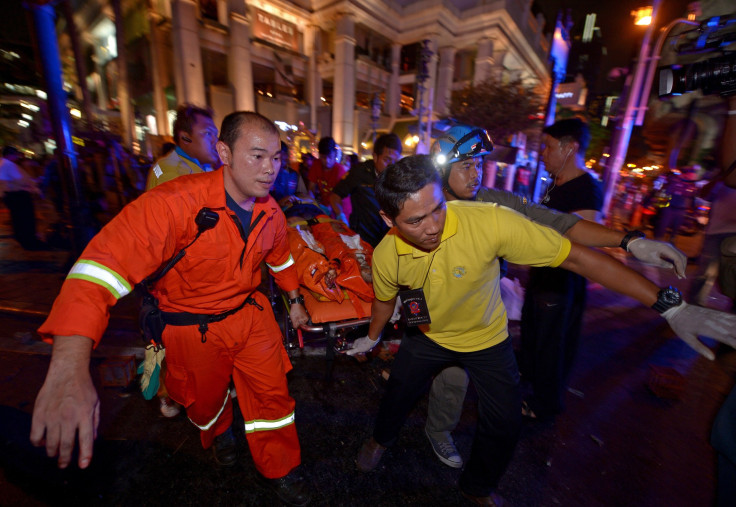Explosion In Bangkok: Will Tourism Take A Hit After Thai Bombing?

A bomb exploded in downtown Bangkok on Monday, killing several people and wounding many more. The violent attack in a high-traffic area that draws tourists and locals alike has raised concerns that the bombing could hurt Thailand's booming tourism industry, a major driver of jobs and wealth in the country.
Visitors from all over the world visit Thailand's tropical beaches and bustling cities, with tourism accounting for one-tenth of the nation’s gross domestic product. But while the country’s tourism industry has historically remained unaffected by years of domestic unrest and minor violence, tourism professionals said the violent bombing could deter tourists from visiting Thailand, at least for the short term.
“I think this is likely to affect [tourism] more,” said Pierce Haney, manager of the Southeast Asia division of Easy Tours, a Texas travel agency that helps plan visits to Thailand, adding that “the past bombings have been sort of failures, but this one, they built a pretty decent bomb.”
The bomb that killed at least 18 and wounded more than 80 on Monday was detonated inside a motorcycle near the Erawan Shrine in central Bangkok. Several tourists, mainly from China or India, were killed in the blast.
Explosives experts comb the Bangkok blast site. The sign above says "Bangkok - City of Life." pic.twitter.com/3M1dMULvMq
— Andrew RC Marshall (@Journotopia) August 17, 2015Thai police did not immediately identify the people responsible for the attack or their motivations. Some authorities suspected that it could have come from dissidents who oppose Thailand's military regime.
"[The] people who did it targeted foreigners and to damage tourism and the economy," said Prawit Wongsuwong, defense minister and a key orchestrator of a military coup in May 2014, Agence France-Presse reported.
In the bloodless coup, led by Gen. Prayuth Chan-ocha, chief of the Thai military, the army took power and imposed martial law. Some Thais welcomed the coup, given that the elected government had often been accused of corruption, and unrest had been building for months. Despite promised reforms, however, the military leadership has done little to change Thailand’s governing structure in the past year and continues to rule through martial law.
Tourism in Thailand dropped about 6 percent in the months after the coup. By January, the number of visitors had spiked back up to well over 2.8 million.
Bangkok bomb: Reports that four foreigners are among 27 dead http://t.co/We4uXlUtzo pic.twitter.com/p8kKnaFU5q
— The Telegraph (@Telegraph) August 17, 2015“These things generally have pretty short impact times,” said Haney. He said the majority of clients were “not scared off by [the coup]” and that trips booked through his agency picked back up within one to two months afterward. He said he was surprised by the news of Monday’s explosion.
“I thought things had been getting stable over there,” said Haney, whose company has been sending Americans to Thailand since 2006.
If Chinese are high among victims, the fallout for Thai tourism could be massive. Chinese tourists are very sensitive to security issues
— Alessandro Ursic (@aleursic) August 17, 2015Visitors to Thailand injected more than $46 billion into Thailand's economy in 2013, with money spent on food, tours, and hotels, the World Bank says. The figure was up almost $10 billion from 2012, when tourism accounted for $37.7 billion spent by tourists. The flow of tourists has helped reduce Thailand's poverity rate from 21 percent in 2000 to about 12.6 percent in 2012.
A Capital Economics report had predicted that 2015 would see even more growth in the Thai tourism sector. Last December, the Tourism Ministry forecast 29 million visitors to Thailand by the end of 2015.
© Copyright IBTimes 2024. All rights reserved.






















